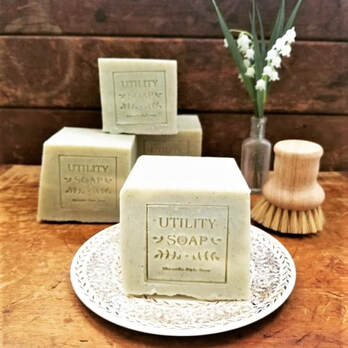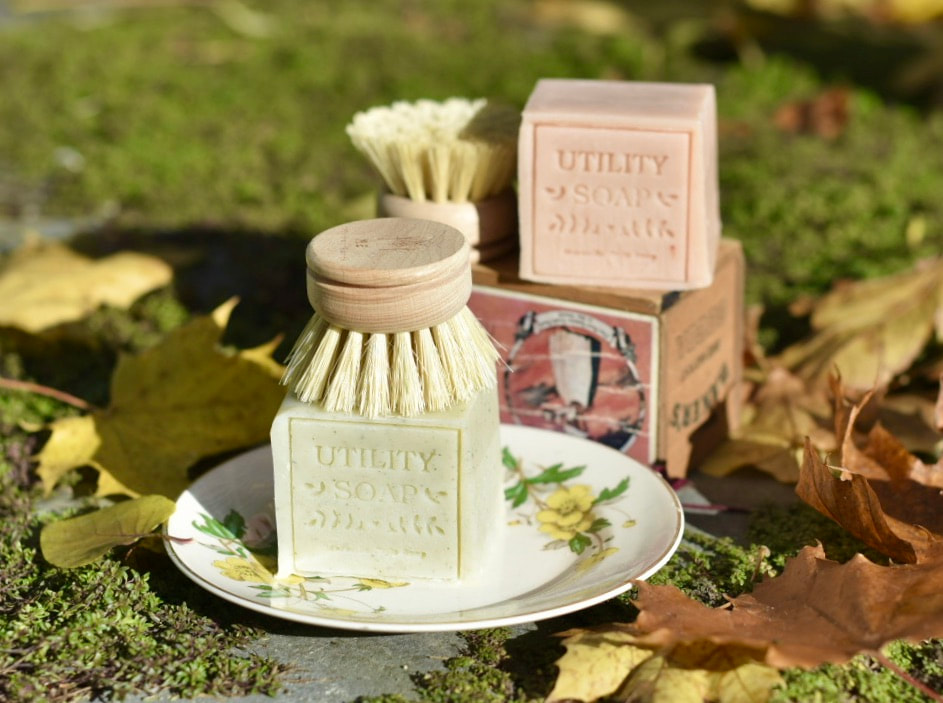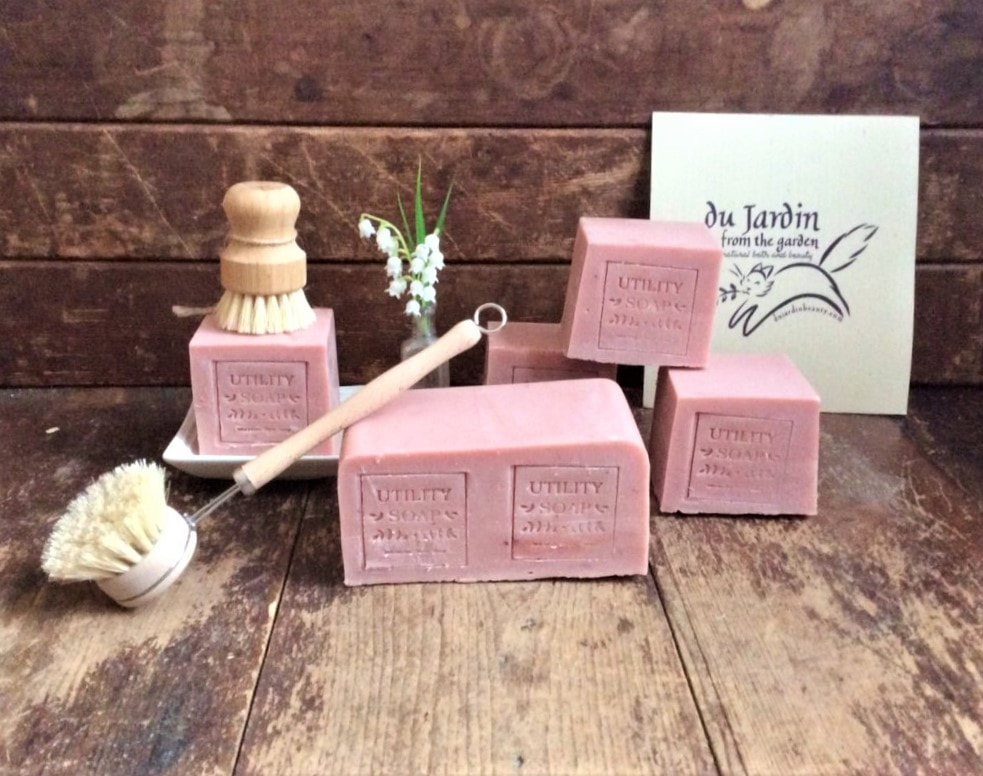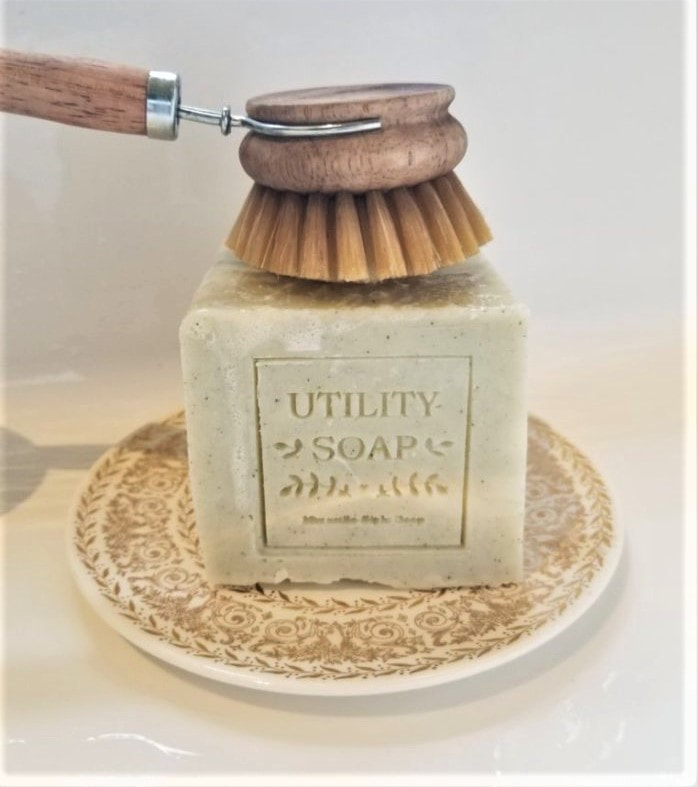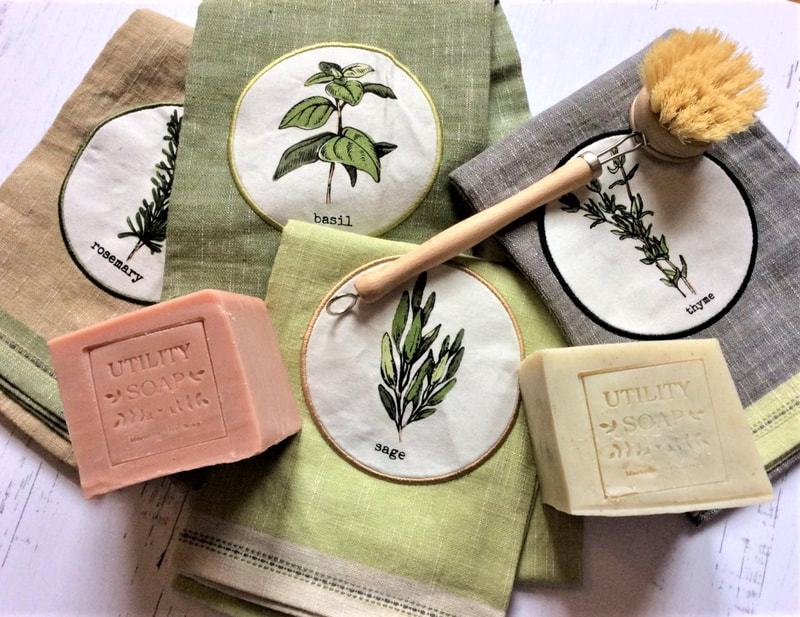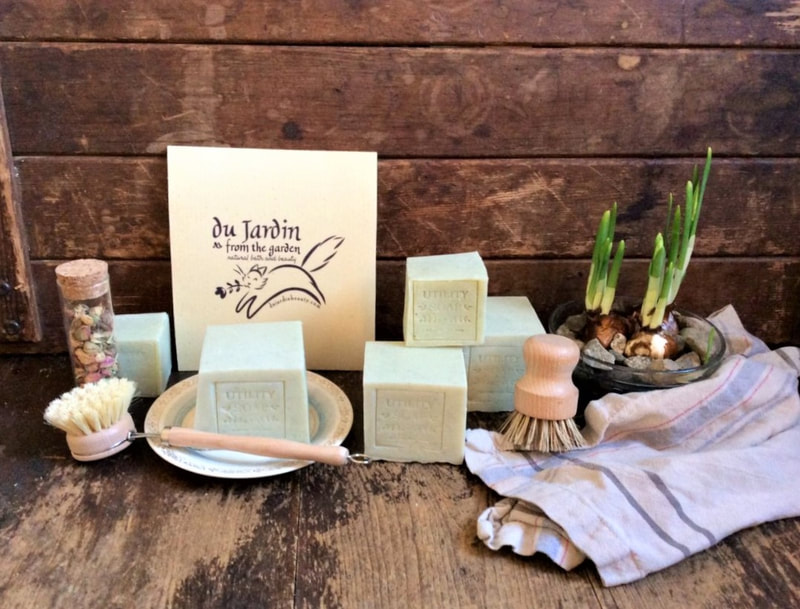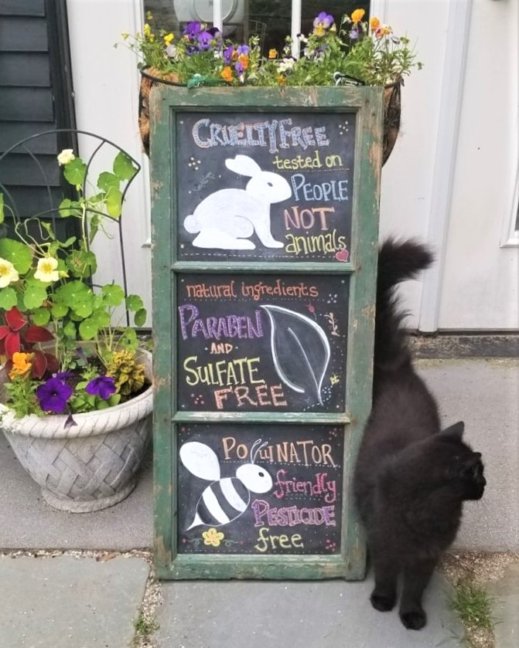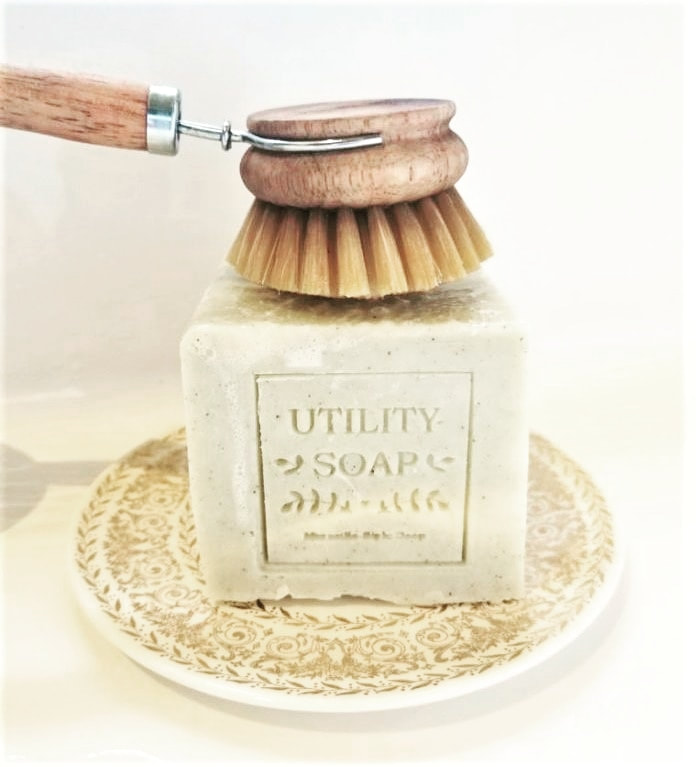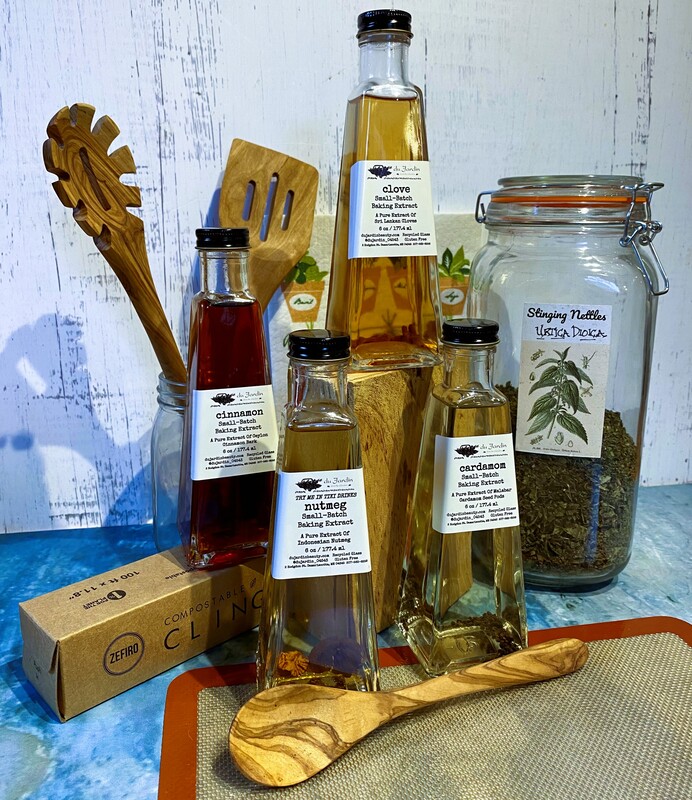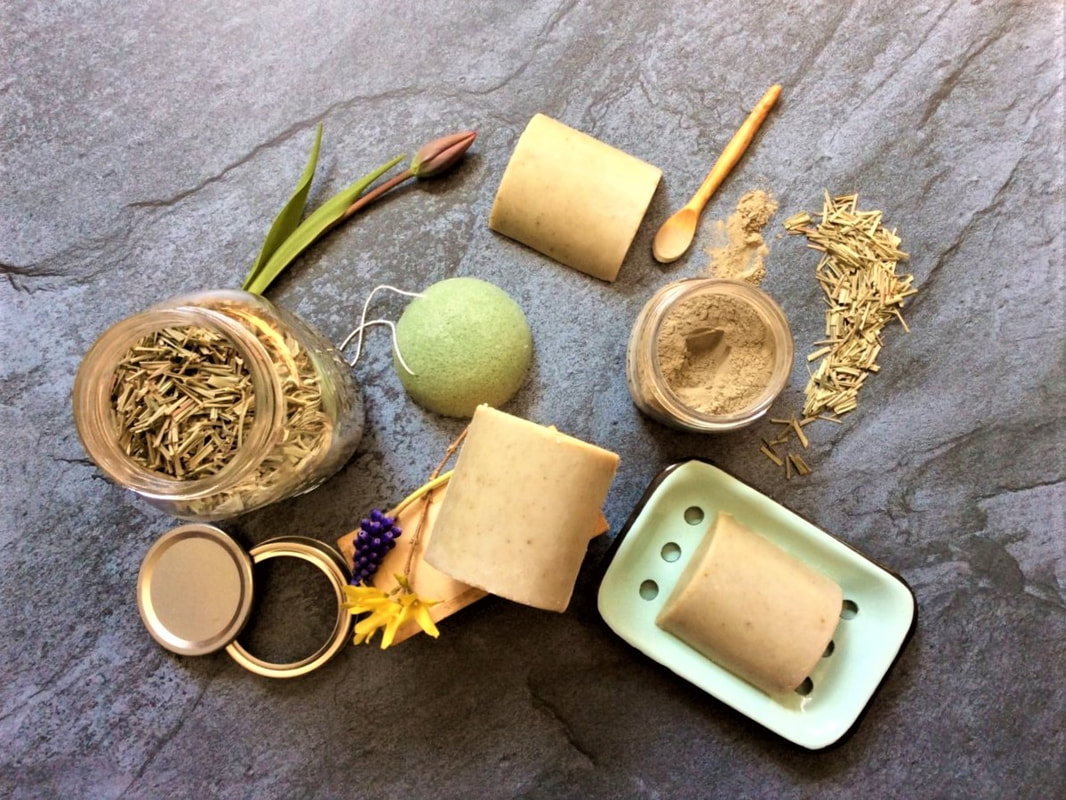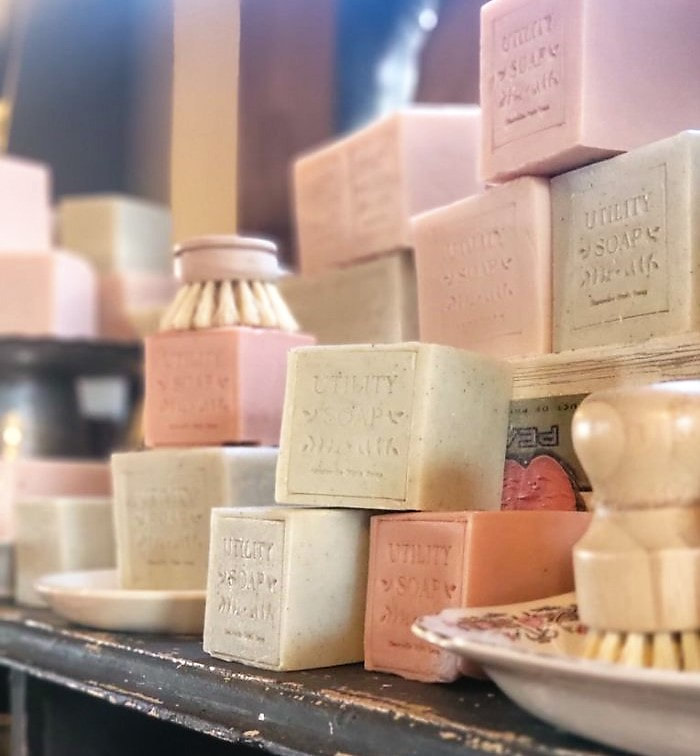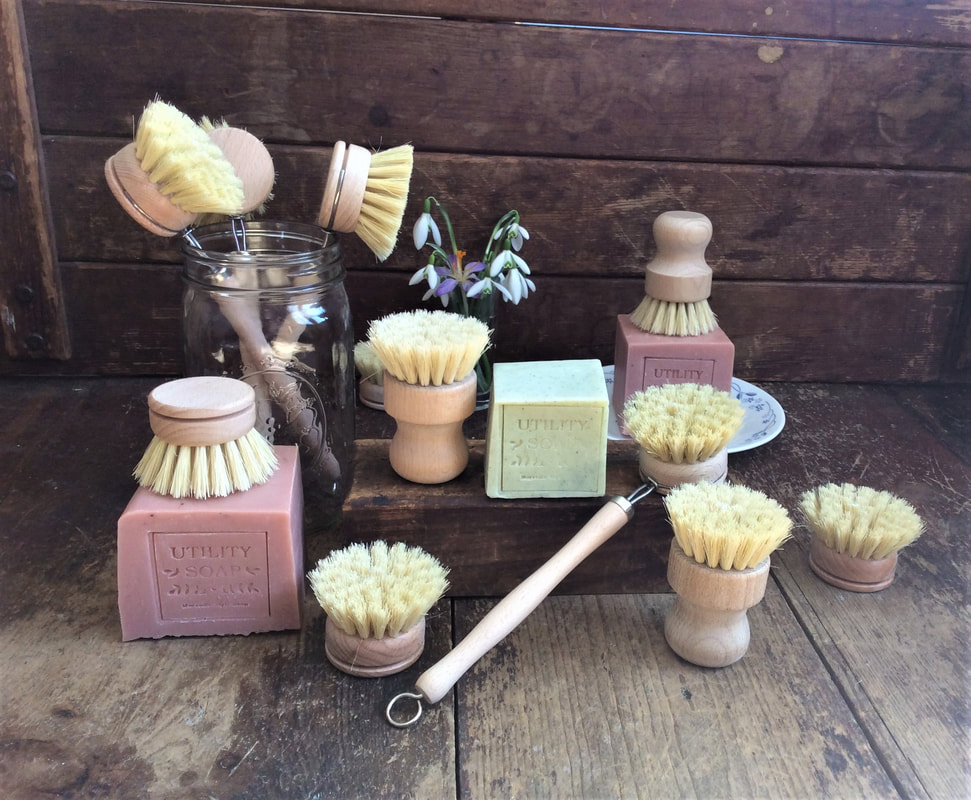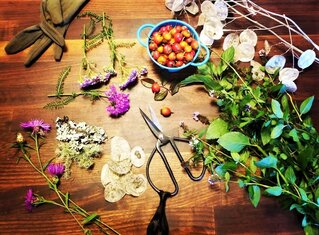|
One soap to clean everything? It may sound too good to be true, but savon de Marseille style soaps have a long history of doing just that! It is time to revisit this centuries old product that fits perfectly into a modern, eco-friendly, zero-waste lifestyle. Join me as we explore its history & many uses.  Photo from marvellous-provence.com Photo from marvellous-provence.com A traditional, hard soap crafted from olive oil & salty sea water, this style of soap has been made in the south of France for over 600 years. It has been used to clean everything from infants to kitchens, stone floors to laundry, & is one of the most gentle, moisturizing soaps made. Cut in large, square blocks, the soap cubes are meant to be grated or rubbed to use rather than picked up as you would traditional bar-soap. In 1688, Louis XIV set in place regulations limiting the use of the title “Savon de Marseille,” defining it as a soap made of at least 72% olive oil with no animal fats, & so began the proud tradition of stamping the cubes. 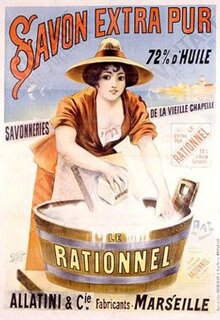 Classic French advert for savon de Marseille Classic French advert for savon de Marseille The early 1900s saw a decline in use of savon de Marseille with the arrival of synthetic detergents & soaps. Luckily, the production of this special soap never stopped completely. Recipes have been preserved, as have production secrets, & today it is being rediscovered for its effectiveness, simplicity, wide applications, & ecological value. More & more, people are looking for eco-friendly cleansers with minimal packaging, & discovering this gem has been here all a long. 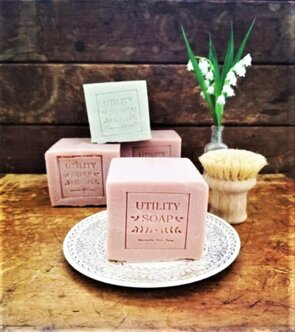 Stamped cubes of French Utility soap, our take on classic savon de Marseille. Stamped cubes of French Utility soap, our take on classic savon de Marseille. As I already mentioned, it is an incredibly gentle soap & is wonderful as a hand or body cleanser, even for those with very dry skin, sensitive skin, or for small children. Anyone who has had the pleasure of using chemical-free crafted soap knows you can literally feel the difference on your skin -- cleansing, but not at all drying. True savon de Marseille soap takes this to a different level & really must be experienced to understand. It is an extremely effective cleanser & unbelievably gentle at the same time. 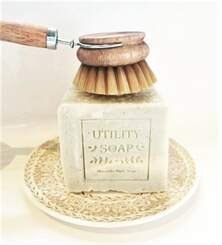 A natural bristle dish brush & an old, vintage saucer are the perfect sink side companions! A natural bristle dish brush & an old, vintage saucer are the perfect sink side companions! Savon de Marseille is also a fabulous choice for dishwashing. It effectively cuts grease, but is gentle to delicate surfaces. Pots & pans to fine crystal, truly all you need for squeaky clean dishes. A big cube on an old vintage saucer next to your sink is a double joy -- perfect for washing up your dirty dishes AND your hands! To use for dishes, simply wet a dish-brush or sponge & rub in a circular motion on top of the block to load. No plastic bottles, no waste, no fuss. It cleans like a dream & leaves your hands soft too! Where savon de Marseille is LIFE CHANGING is in your laundry room! You can use it to not only wash clothes in your washer, but also to make a lovely delicates/ hand wash liquid [recipes to follow.] It even works as a stain remover/spot treatment: barely wet your cube & rub it directly on the troubled area. Allow the soap film to dry on the stain, then wash as normal. Works like a charm! For use in the laundry, most people grate their soap [large holes on a traditional box grater works just peachy, but I prefer to use the grating disc on my food processor!] I know a few people who simply add a small amount of finely grated soap directly to their washing machines in the detergent dispenser, roughly ¼ cup per load. I personally prefer to make my own laundry soap from the grated flakes. It is easy to do, a more economical use of your soap, & you can make a large batch up once a month or so to use as needed like store bought laundry soap-- except NO PLASTIC & no chemical cleaning agents, just a completely hypoallergenic, ultra-gentle laundry soap! Here is the basic recipe to make your own laundry detergent: 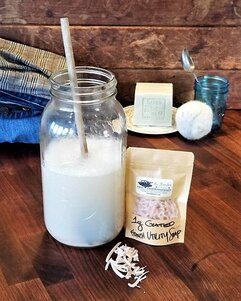 Grate it yourself or buy our pre-grated soap -- Easy & fast! Grate it yourself or buy our pre-grated soap -- Easy & fast! 1 oz Grated savon de Marseille soap [ or our French Utility Soap]
It will keep rather indefinitely in this state--simply shake the mixture before use. Every machine is a bit different, so it will take a few ‘gos’ before you find the perfect amount per load for yours. About 3 ounces for a load is a good starting point. This laundry soap is absolutely wonderful, especially for avoiding allergic reactions for people with very sensitive skin or infant clothing. 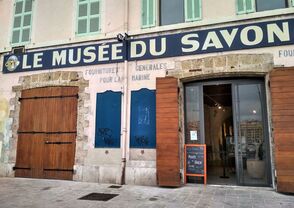 Le Musee du Savon in Marseille details the soap's fascinating history. Le Musee du Savon in Marseille details the soap's fascinating history. For hand washing delicates or wool [savon de Marseille is particularly fabulous for wool,] make up the following wash: 1 TBS Grated savon de Marseille [French Utility soap] 20 oz Hot [almost boiling] water. Mix to combine until you get a milky, slightly foamy wash. Soak your clothes overnight in this solution. Rinse well the following morning. Excellent for silks & such, but really something special for wool & cashmere sweaters. The delicate essential oil blend in our French Utility soap also acts as an antibacterial agent to help protect them! [if using regular unscented savon de Marseille, you may wish to add a few drops of essential oil like lavender to your wash for this purpose] 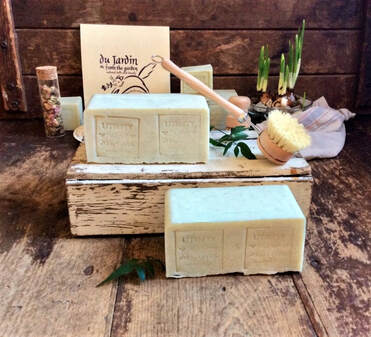 We offer our Utility soaps in Small and Jumbo Cubes, as well as Deluxe Household Blocks. We offer our Utility soaps in Small and Jumbo Cubes, as well as Deluxe Household Blocks. Another area that savon de Marseille shines [no pun intended] in is basic household cleaning. Works well on kitchen counters & bathroom surfaces, as well as in the bathtub. Simply rub your soap onto a damp sponge or cloth to use, & rinse well. Wonderful for degreasing stone counters & tiled floors-- even on slate. To clean stone surfaces, wet a brush in water with savon de Marseille, & use in a gentle circular motion. It can even be used for spot treatment of sofas & leather furniture, but be sure to wring out your cloth very well. Finely grated savon de Marseille soap can also be used to make a completely biodegradable insecticide. 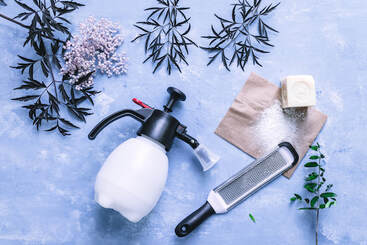 Photo by French By Design. Photo by French By Design. It is even safe to use on edible plants & trees, leaving fruit & herbs protected but still able to be consumed once rinsed. Dissolve 2 TBS grated savon de Marseille in a spray bottle with very hot water. Spray affected plants & soil, repeating for 3 days for maximum effectiveness.  Silver Jewelry Image by the Peach Skin. Silver Jewelry Image by the Peach Skin. Savon de Marseille style soaps can be used to clean jewelry. It brings the sparkle back to gems & can help remove tarnish from sterling silver pieces. Fill a deep bowl with very hot water & add some grated flakes of the soap. Stir to dissolve, then add jewelry pieces & allow to sit for about 15 minutes. Rub each piece under the liquid before removing, then rinse with fresh water & dry. The final use I have heard of for this magical substance to as a moth & mite deterrent in the closet! apparently, hanging a slice of the soap in the closet helps to protect your clothing handily, but must confess I have not tried this myself. :D As you can see, it really is great for cleaning just about anything! Be sure to use a true savon de Marseille style soap for these purposes. French Utility soap is our take on the classic, made according to traditional specs. Ours features 74% olive oil with the addition of fine pink French-Clay or green zeolite clay, giving it a gorgeous, tonal color & increased cleansing efficacy. It also contains a soft essential oil blend to fragrance it that has the added bonus of working as an antibacterial agent, helping to disinfect all we clean with it. We are happy to offer it in traditional cube form, as well in rustic bars, all with zero plastic packaging. Absolutely the best all-around cleaner, no home looking for a multi-purpose cleanser should be with out it -- It is our number one selling item for this reason! I hope this post helps you to get the most out of yours! If there are any other uses I have missed, please let me know in the comments! the ECO-friendly solution to all your
cleaning needs. Our modern take on this Centuries-Old, French Cleaning Classic is Available in traditional large cubes & blocks, rustic bars, & even pre-grated for laundry. pair it with a few Sustainably-sourced accessories to fill all your household cleaning needs.
9 Comments
Lindsay
7/28/2019 07:41:40 am
Just made up a batch of the laundry soap and can’t wait to try it!!! I already have been using this soap for hand washing and dishes for .... idk a year? And ummm still have the same two cubes I originally bought!!! Just saying it lasts forever!! Well made and cured proper I’d say! It’s taken a bit of getting used to for visiting friends ... “where’s your hand soap? Dish soap?” Right there !! That block ... the same one for both? Yup!! Then they love it!! Also it smelllllllssss Devine!!!
Reply
12/25/2020 10:09:41 am
Hi! Thanks for much for all of the helpful information you write!
Reply
1/14/2021 06:38:34 am
Hello,
Reply
Amanda
1/17/2021 01:05:18 pm
Can I use the grated soap to make liquid dish soap? I’ve tried dish blocks before and it’s hard to use towards the end. Really missing the liquid. Seems like this would be a great option! How long does it last as a liquid?
Reply
Great question! I have made it into liquid soap frequently-- for laundry & handwashing, but also for insect spray to keep the fungus gnat out of houseplants in the winter. I do not see why you wouldn't be able to make it up & use it on your disease that way too! I would follow the recipe & leave out the vinegar & baking soda [they work as fabric softeners] & keep it in a bottle by the sink--to use, I would squirt a bit on your dish brush & clean away! A little should go a LONG way. The liquid version doesn't go bad once constituted into the water. You can either grate your own from cubes [which is what I always do with the weird, amorphous blob at the end of cube-cycle! LOL] or buy pouches of our pre-grated laundry soap. It should work just the same--Let me know what you think!
Reply
4/18/2022 07:01:06 am
Great Post. I really appreciate it. Hope it will be helpful for others who search for the best resource about it. Thank you so much for the helpful post.
Reply
8/19/2023 08:50:54 am
This blog is an absolute gem for anyone seeking effective and eco-friendly cleaning solutions. The detailed guide on using Savon de Marseille-style soaps to tackle a wide range of cleaning tasks is not only enlightening but also incredibly practical. The step-by-step instructions accompanied by insightful tips make the whole process seem effortless, while the emphasis on using natural ingredients is a refreshing departure from harsh chemical cleaners. Whether you're a cleaning aficionado or just looking to make your cleaning routine more sustainable, this article is a must-read that effortlessly combines traditional wisdom with modern cleaning needs.
Reply
Leave a Reply. |
Categories
All
Archives
May 2024
|
|
|
'Beautiful & responsible' Online: Ship or Pick-Up
Store Hours: Wednesday 11 am - 4 pm Thursday 11 am - 4 pm Saturday 11 am - 3 pm Damariscotta Farmers Market: May 17 - Oct 25 2024 |
207-563-6256 [email protected] © Du Jardin 2019
In the Smitten Barn - 2 Hodgdon Street - Damariscotta, Maine 04543

